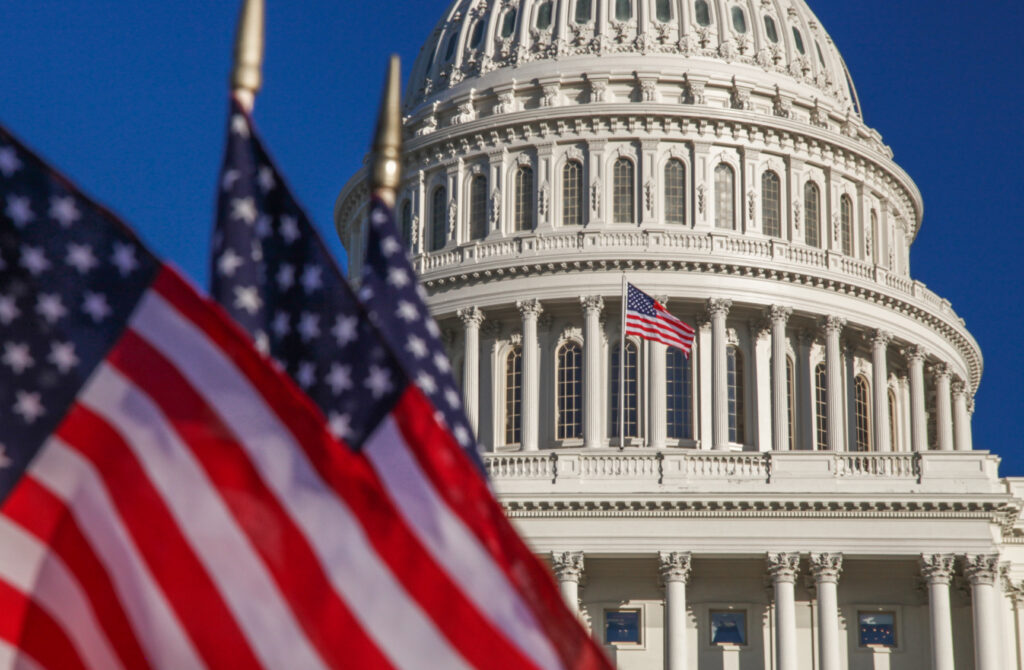Analyses / Political and Geostrategic Observatory of the United States
31 March 2025
United States: Where is the opposition?

In his haste to expel undocumented immigrants, shrink the size of government, and eliminate “wokeism” from American politics, Donald Trump is acting at breakneck speed. So fast, in fact, that he appears perfectly willing to bulldoze democratic norms to get there. That alone is shocking to many observers of the American political scene. Perhaps just as surprising is the scant resistance Trump has encountered so far. There are numerous safeguards in the American system, both formal and informal, to prevent undemocratic impulses from our leaders. Yet the president has managed to weaken these democratic protections largely without organised opposition. Even before Trump took office in 2025, the Economist Intelligence Unit’s global democracy index ranked the United States as a “flawed democracy”. Over the past two months, that downward trend has clearly accelerated, and those tasked with protecting American democracy have largely failed to step up.
Within the government itself, the president has dismantled the structures and customs designed to prevent abuse. In short, there are fewer and fewer civil servants within the executive branch empowered to say “no” to the president when he seeks to bypass the rule of law. Shortly after taking office, for example, Trump fired 17 inspectors general—independent watchdogs within government agencies tasked with preventing fraud and misconduct. Traditionally, these officials do not change with administrations and are accountable to Congress. The White House has taken steps to hinder or effectively eliminate federal regulatory agencies that could slow its agenda, such as the Consumer Financial Protection Bureau, the Equal Employment Opportunity Commission, the National Labour Relations Board, the Federal Trade Commission, and the Securities and Exchange Commission. Trump has violated key norms separating the executive from decision-making on investigations and prosecutions, thus politicising the Department of Justice and the FBI.
Congress has been disturbingly silent in the face of Trump’s efforts to expand executive power at the expense of congressional authority. The US Constitution explicitly defines the legislative branch as a co-equal and counterbalancing power to the executive. Even when controlled by the president’s own party, Congress has historically guarded its prerogatives jealously. Not anymore. Trump has, for instance, decided to shut down several government agencies, including the US Agency for International Development and the entire Department of Education, by executive order. These agencies were established by laws enacted by Congress, and the president has no constitutional authority to repeal law by decree. Yet congressional Republicans have shown little resistance to this power grab.
The main battles in the months ahead will be fought in the courts. Lower courts have begun hearing a wide range of legal challenges to some of the administration’s most egregious actions. According to The New York Times as of 15 March, 46 separate rulings have temporarily halted various government initiatives on matters ranging from the summary dismissal of federal employees to the freezing of federal funding to states. The Supreme Court has only just begun reviewing some of these cases. Despite a conservative majority generally sympathetic to the president, the Court has already issued a few initial rulings against the administration. But the administration and its Republican allies have increasingly advanced a theory of government suggesting there should be few, if any, limits on the president’s authority over the executive branch he controls. That includes “interference” from the courts. In February, Vice President Vance tweeted: “Judges are not allowed to control the legitimate power of the executive.” This stance is at odds with centuries of American legal precedent, yet there are growing signs that the administration will simply ignore adverse rulings. That seems to be the case, for instance, in a recent legal challenge to the administration’s highly questionable use of the Alien Enemies Act to deport undocumented migrants. More troubling still, the president personally threatened the judge in that case with impeachment. This prompted Chief Justice John Roberts to issue a highly unusual statement, warning that impeaching judges is not an appropriate response to legal disagreements. If Trump simply ignores inconvenient rulings, one of the most critical checks on executive authority will cease to function.
The main pillars of democratic society outside government also appear reluctant to stand up to presidential overreach. The media, long considered the “fourth branch of government,” has recently retreated on press freedom issues. Trump has aggressively pursued news organisations whose coverage he finds objectionable, and those companies seem hesitant to confront the administration over their First Amendment rights. Trump has targeted academia in a dramatic assault on intellectual freedom, and universities dependent on federal research funding have been unwilling to oppose the Trump administration’s decisions. Most striking was the unprecedented agreement with Columbia University, which was forced to enact major changes to its campus policies on antisemitism and how Middle East studies are taught, in exchange for the restoration of $400 million in federal grants. Trump has even taken aim at the legal profession, specifically targeting law firms with links to Democrats. One major firm signed a deal pledging to support causes championed by the president to the tune of $40 million in exchange for the cancellation of an executive order that directly targeted the company.
Even the official opposition is struggling to mount a coherent response to Trump’s anti-democratic activism. The decision by Democratic Senate leaders to support the latest budget enforcement bill is a prime example. Elon Musk’s “Department of Government Efficiency” has made a mockery of the congressional budgeting process by imposing massive cuts to government spending, which, under the Constitution, is supposed to be determined by Congress—not by a boutique office operating out of the White House. Fearing that a government shutdown would hurt the Democrats, Senate Minority Leader Chuck Schumer nevertheless chose to capitulate on the budget rather than push back against Elon Musk’s unconstitutional cuts. Without control of the White House and in the minority in both chambers of Congress, we might expect Democratic state leaders to take the lead. Yet leading Democratic governors have so far been surprisingly silent.

